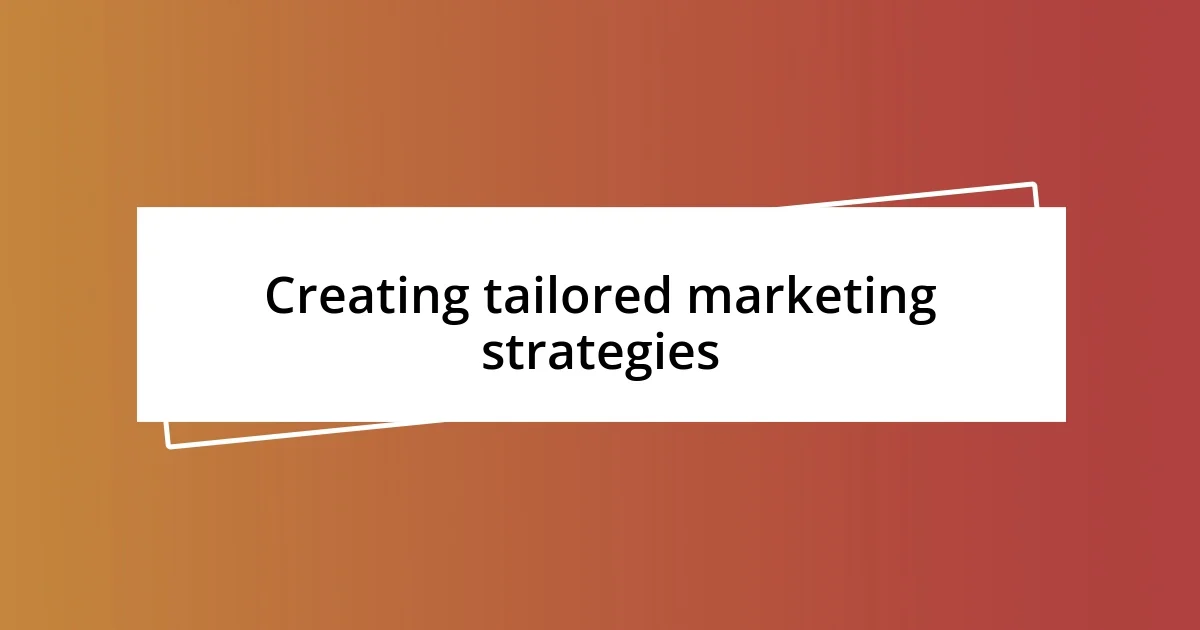Key takeaways:
- Niche markets foster passionate and loyal communities, making genuine emotional connections vital for brand success.
- Thorough niche market research uncovers specific customer needs, identifies opportunities, and informs tailored marketing strategies.
- Scaling a niche business benefits from community engagement and strategic partnerships, enhancing brand visibility while maintaining niche appeal.

Understanding niche markets
Niche markets are essentially specialized segments within a broader market, and understanding them is key to effectively reaching your audience. I remember the first time I stumbled upon a niche community in the health food sector. It was like discovering a hidden gem, where every product was crafted not just for profit but for people who genuinely cared about sustainable living. Isn’t it fascinating how these communities can be thriving yet largely overlooked by mainstream marketers?
When you dive into a niche market, you often find passionate customers who are dedicated and vocal about their preferences. This was evident when I engaged with a group of outdoor enthusiasts who were obsessed with eco-friendly camping gear. The emotions ran high as they debated product quality and ethical sourcing. It made me realize that tapping into these emotions and values is crucial for connecting with niche audiences on a deeper level.
It’s also worth considering how niche markets can lead to brand loyalty like nothing else. Think about it: when was the last time you felt genuinely welcomed in a store or online space that catered specifically to your interests? For me, it was a local bookstore that specialized in fantasy novels. The owner knew my name and my favorite authors, and that personal touch transformed my buying experience into something truly special. Understanding niche markets isn’t just about selling; it’s about building relationships that foster loyalty and trust.

Importance of niche market research
When it comes to niche market research, its importance can’t be overstated. It serves as the foundation for identifying potential customers and understanding their specific needs. I recall attending a workshop focused on a niche market in handmade artisan goods. The insights shared by the participants on consumer behaviors were eye-opening, highlighting how a deep understanding of this market led to tailored marketing strategies that resonated personally with their audience.
Here are a few reasons why niche market research is vital:
- Targeted Strategies: Knowing your audience allows for focused marketing efforts, reducing wasted resources.
- Uncovering Opportunities: Research reveals gaps in the market, opening doors for innovative offerings.
- Brand Differentiation: Understanding what makes your niche unique helps in crafting distinct value propositions.
- Building Empathy: Delving into customer preferences helps tailor messaging that resonates emotionally, creating stronger connections.
Ultimately, taking the time to conduct thorough niche market research sets the stage for more effective engagement and, as a result, greater success.

Identifying profitable niche opportunities
Identifying profitable niche opportunities requires a keen eye for detail and an innate curiosity about consumer behavior. I remember the moment I discovered a rising trend in the vegan beauty market. Exploring social media groups dedicated to cruelty-free products opened my eyes to a community eager for reliable information and product recommendations. By immersing myself in their discussions, I could see not just their preferences but their passion, which sparked ideas for products that could genuinely serve their needs.
Another area to consider is examining how established brands engage with their target audience. I once analyzed feedback on eco-friendly household products. Customers weren’t just sharing what they liked; they were revealing unmet desires for sustainable packaging and locally sourced ingredients. This experience taught me the value of listening carefully; the insights gained can highlight profitable niches that others may overlook.
Lastly, leveraging keyword research tools can be a game-changer in this process. By analyzing search trends, I found a growing interest in zero-waste living. It was impressive to see a wealth of opportunities just waiting to be explored. Understanding what people are actively seeking can provide a clear roadmap for developing products that meet their evolving demands.
| Method | Insights Gained |
|---|---|
| Community Engagement | Understanding consumer passion and preferences |
| Feedback Analysis | Identifying unmet needs and desires |
| Keyword Research | Spotting trending interests for product development |

Analyzing target audience characteristics
Understanding your target audience’s characteristics goes beyond basic demographics. I recall a time when I focused on a specific segment of pet lovers who prioritize holistic products. These insights transformed my approach. By engaging with this community in online discussions, I learned that many sought not just any product, but ones that aligned with their values, such as sustainability and natural ingredients. Isn’t it fascinating how a simple conversation can reveal what truly drives consumer choices?
Diving deeper into their preferences, I realized that emotional connections played a crucial role. For instance, many in this niche shared stories about their pets’ health journeys, fostering a sense of community and shared experience. This revelation made me appreciate the power of storytelling; it’s a compelling way to connect on a level that’s often overlooked in traditional marketing. How many brands miss this opportunity because they fail to engage in genuine dialogue?
Analyzing audience characteristics also means being attuned to changing behaviors. I remember tracking a shift in how people viewed online purchasing—suddenly, convenience was at the forefront. Engaging directly through surveys and feedback forms helped me capture this evolving mindset. It’s imperative to stay flexible and responsive; human behavior is dynamic, and being in tune with it ensures that the offerings remain relevant and appealing. Don’t you think that adaptability could be the secret ingredient to sustained engagement?

Creating tailored marketing strategies
Creating tailored marketing strategies is all about understanding the unique needs and preferences of your niche market. I remember when I shifted my focus to a community of tech-savvy seniors. They weren’t just looking for basic gadgets; they wanted user-friendly interfaces that offered connections to their grandchildren. By directly engaging with them through online forums, I was able to uncover their specific concerns and desires, shaping my marketing strategy to highlight those features.
Additionally, I learned the significance of personalization in messaging. For example, when promoting travel packages for adventure-loving millennials, I emphasized experiences over material benefits. I found that using visuals and testimonials that resonated with their sense of adventure effectively captured their attention. Have you ever noticed how a relatable image can evoke a strong emotional response? It’s all about creating content that reflects their lifestyle and seeks to speak directly to their aspirations and fears.
One time, while developing a campaign for eco-conscious consumers, I tapped into the storytelling aspect by sharing real stories of sustainable brand journeys. I vividly recall the feedback; people felt inspired, even empowered. It reinforced the idea that authentic connections can drive engagement. Doesn’t it just make sense to share not just what you offer, but the “why” behind your brand? This authenticity builds trust, and trust is what ultimately converts interest into action.

Measuring success in niche markets
Measuring success in niche markets is an intriguing process. I vividly recall the first time I launched a campaign aimed at organic skincare enthusiasts. Instead of just looking at sales numbers, I focused on engagement metrics, like social media shares and comments. Those interactions revealed the true passion behind the purchases, showcasing deep brand loyalty. Can you believe that the conversations around products often tell you more than the sales figures themselves?
Another aspect I’ve found essential is tracking customer feedback and testimonials. While working with a brand that specialized in handmade jewelry, I encouraged customers to share their stories alongside their purchases. The heartfelt messages we received not only highlighted their positive experiences but also created a powerful sense of community around the brand. Isn’t it remarkable how those personal stories can foster connection and inform future product development?
Finally, I learned the importance of setting specific KPIs tailored to the niche. When I worked with a sustainable clothing line, we measured success not only by units sold but also by the impact on environmental initiatives. Each sale contributed to tree planting efforts, which excited our customers and facilitated deeper engagement. How do you quantify impact in your niche? It’s about widening the lens and appreciating the broader effects of our business on the community and environment.

Scaling your niche business model
Scaling a niche business model can be both exhilarating and daunting. I remember when I expanded my eco-friendly product line. Initially, I focused on local markets, but as demand increased, I knew I had to explore online platforms. The moment I launched my first targeted ad campaign, the sales surged, showing me the power of reaching a broader audience without losing the niche appeal.
What truly helped me scale was building a community around my brand. I decided to host online workshops where customers could share their sustainable living tips. The feedback was incredible! Not only did participation reinforce their loyalty, but it also gave me insight into new product ideas. Have you ever engaged your audience so deeply that they become part of your development process? It’s a game changer.
Lastly, embracing strategic partnerships became vital as my niche business grew. Collaborating with like-minded brands allowed me to tap into their customer base while adding value to both sides. I’ll never forget the joint webinar I did with a popular zero-waste influencer. It not only drove traffic to my site but also united our missions, creating a powerful synergy. Isn’t it fascinating how combined efforts can amplify your reach while staying true to your core values?














